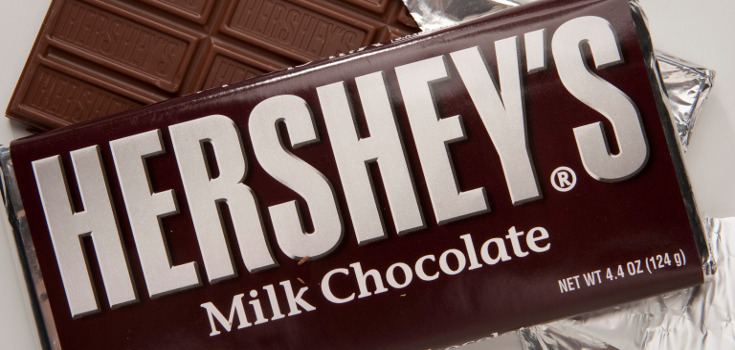Hershey Considers Removing High-Fructose Corn Syrup for Real Sugar
Hershey Considers Removing High-Fructose Corn Syrup for Real Sugar
Our voice is still being heard
Chocolate-producing giant Hershey offers many highly processed chocolate candies and products, and that most definitely won’t change anytime soon.
Chocolate-producing giant Hershey offers many highly processed chocolate candies and products, and that most definitely won’t change anytime soon. The mega-corp is, however, consideringan ingredient transition which would replace the highly vilified (for good reason) high fructose corn syrup with old-fashioned sugar. It doesn’t change much in terms of the health-qualities of the company’s chocolate products, but it is a sign of how our collective voice is causing companies to alter their chemical-laden products.
Will Papa, chief research and development officer at The Hershey Co, told the Associated Press the company uses a mix of sugar and high-fructose corn syrup in its products but that it is “moving more toward sugar”.
“We take into account what consumers want. And consumers are telling us between the two, they prefer sugar ,” Papa said.
In an emailed statement, Hershey said its work on “exploring” the replacement of high-fructose corn syrup “is just under way” and that it did not have a timeframe on when it might be complete.
“Our aim is to be transparent with our consumers about the ingredients we use in our products. Once we have more information to share, we will be back in touch,” Hershey said in its statement.
Other products that have changed from high-fructose corn syrup to sugar include Gatorade drinks and Yoplait yogurt.
Though while companies like Hershey and Yoplait are seemingly moving toward sugar, other companies are choosing to mask the high fructose corn syrup with other names. One example is with General Mills’ Vanilla Chex, an updated version of the Chex cereal sold in most conventional grocery and discount stores for many years. The front of the box clearly states that the product contains “no high fructose corn syrup” (HFCS), but turn it over to read the ingredient list and there it is – the new isolated fructose.
But if people want high fructose corn syrup gone, why are companies continuing to use it? Because it’s dirt cheap. Much of the corn grown in the US is genetically modified and is largely grown to be made into corn-based ingredients like high fructose corn syrup – an ingredient that is often tainted with mercuryand is linked with numerous ailments.
Between 1995 and 2010 over $260 billion was spent by American taxpayers in agricultural subsidies. Most of that money is put into commodity crops such as corn and soybeans. Between 1995 and 2010, $77.1 billion was given to farmers so that they could grow massive amounts of corn.
The ingreidnet has become widely used as a cheaper replacementfor natural sugar during the past 40 years. That 40 year time span has also seen skyrocketing incidenceof obesity, diabetes, and other metabolic diseases. While as yet it has not been established that HFCS is the direct culprit, the circumstantial evidence is hard to overlook.
One studyfound that the isolated fructose solution, as opposed to other sugars tested, resulted in a doubling of circulating triglycerides. Another studyfound that consumption of HFCS-55 negatively impacts hippocampal function, metabolic outcomes, and neuroinflammation when consumed in excess during the adolescent period of development. Yet even more researchconcluded that beverages made with HFCS have a sugar profile very different than sucrose (table sugar), in which fructose and glucose are equivalent and balanced. It was suggested that current dietary analyses may underestimate actual fructose consumption.The Corn Refiners Association, an industry group, has been pushing backat the negative perceptions about high-fructose corn syrup.
| About Mike Barrett: | |
| Mike is the co-founder, editor, and researcher behind Natural Society. Studying the work of top natural health activists, and writing special reports for top 10 alternative health websites, Mike has written hundreds of articles and pages on how to obtain optimum wellness through natural health. | |
Other Popular Stories:

Post a Comment